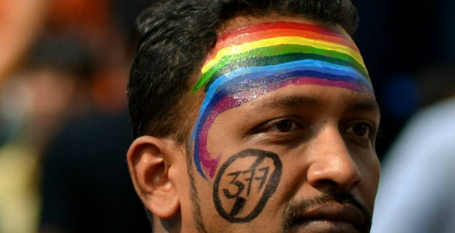The 7th edition of the pride event saw thousands of participants walk from August Kranti Marg to Girgaum Chowpatty on Saturday afternoon. The march had a festive yet charged atmosphere according to Ashok Row Kavi, one of India’s leading gay rights activists.
“Ideally, the march is about taking pride in what you are. But this year’s upsurge in numbers is a reflection of the community’s anger and hurt over being re-criminalized,” he said.
In December, India’s Supreme Court ruled that Section 377 of the Indian Penal code was constitutionally valid, striking down a 2009 court decision that decriminalized gay sex. An appeal against the law was rejected by the Supreme Court on January 29.
The 153-year-old colonial era law states that “whoever voluntarily has carnal intercourse against the order of nature with any man, woman or animal” can be punished by up to 10 years in prison. Read more about the ruling here.

